From mines to hives: Benguet beekeeper advocates honey bee's positive impact on the community, farmers, and environment
By James Tababa

Born in a mining community in Itogon, Benguet, Guadaleva Ballogan Coteng, 28, fondly known as Guada, is recognized as the “Lady Beekeeper of the North” by the beekeeping community. Guada is an inspiration in the field of beekeeping, bringing sustainability, innovation, and empowerment to her community.
Early beginnings and passion for agriculture
Guada holds a degree in Hotel and Restaurant Management. Before embarking on her beekeeping journey in 2014, she worked at a lounge in Baguio. However, she found herself losing enjoyment in her work. She also worked as a gold miner, as that was the primary livelihood in the community. The physically demanding process of extracting and processing rocks for gold made her ponder the true worth of the job. While gold held its value, the labor, sweat, and personal sacrifice behind it made it evident that mining wasn't worth the danger and harm to the environment. This contemplation led her to consider an alternative path – agriculture.
In February 2014, during a visit to Bakakeng, Baguio, Guada discovered a beekeeper training center and enrolled, marking an unexpected opportunity. Over four years, she absorbed knowledge from experienced beekeepers, establishing a deep connection with beekeeping. In a region focused on gold mining, she founded the Purest Heart Apiary.
The trade name "Purest Heart" holds a special connection to Guada's daughter, who serves as the inspiration behind it. Their purpose is sincere, without any intention to mislead anyone in their business endeavors.
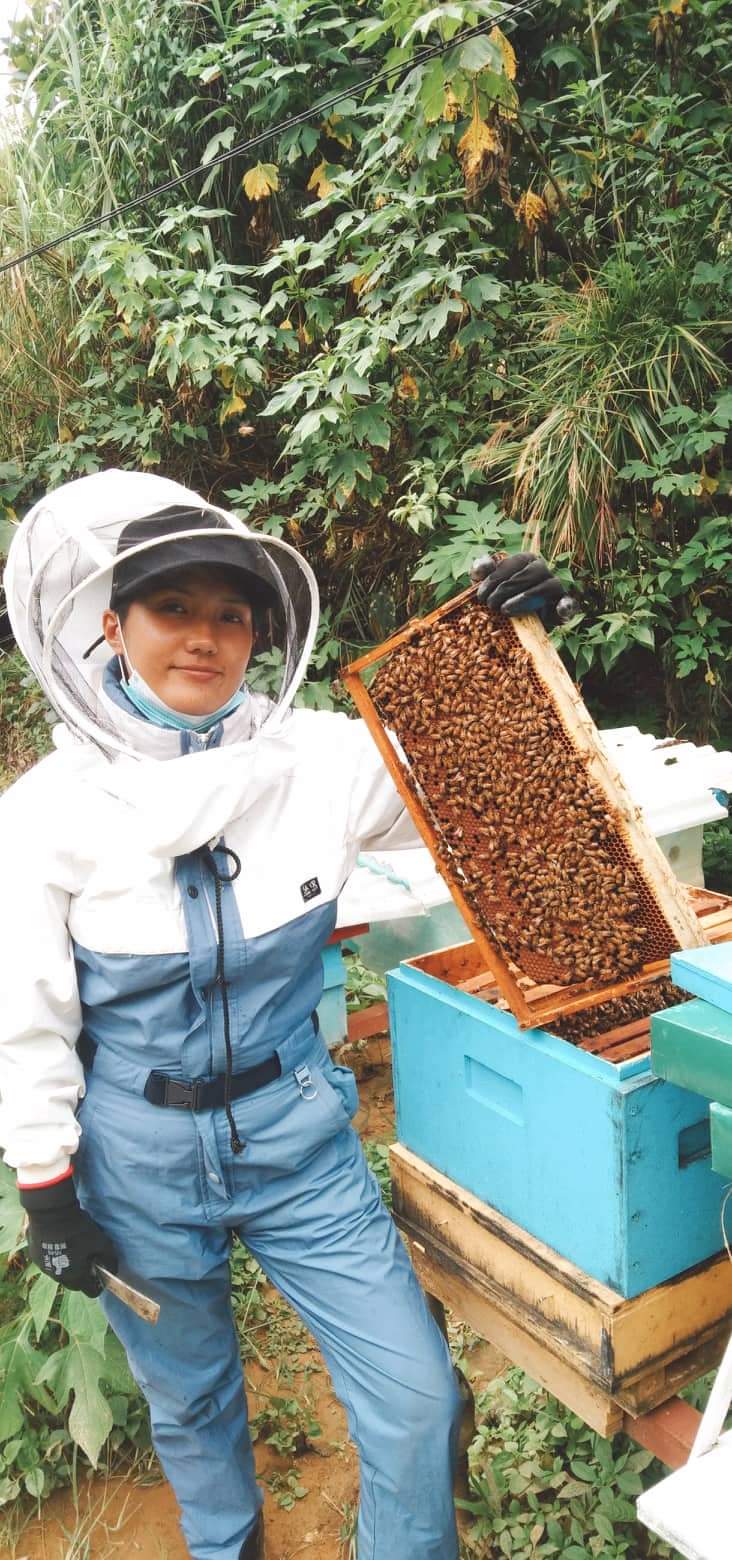
Guada’s apiary focuses on Apis mellifera, also known as the European honeybee, a species that holds a prevalent role in honey production within the Philippines. She has also tried to cultivate stingless bees, exploring their adaptability and potential within their locality.
Eventually, Guada amassed a collection of 15 bee colonies. However, her progress was interrupted by a devastating event — typhoon Ompong (international name Mangkhut) struck, resulting in the loss of all her colonies. The estimated value of the devastation was around P200,000. This unexpected blow left her deeply concerned about her means to recover from such a loss. She reached out to the government for aid, hoping for assistance that could help her restart, even if it meant receiving just a single starter kit. Sadly, during that period, no government funds were allocated for such support.
Overcoming challenges and community impact
Guada reported the situation to the local barangay authorities. A Catholic institution extended aid to households affected by the calamity, and Guada was among the beneficiaries. This financial support played a key role in reviving her business. She started anew with a single bee colony, which she diligently nurtured and expanded to a total of 30 colonies.
In October 2021, an Australian beekeeper expressed interest in acquiring 25 bee colonies from her. Upon receiving the payment for this transaction, she chose to turn her apiary into a more comprehensive venture by integrating mushroom cultivation. Despite lacking prior knowledge in this area, she immersed herself in learning through online videos. Over time, her dedication bore fruit as she not only grasped the fundamentals of mushroom production but also established a network of fellow mushroom growers within the community.
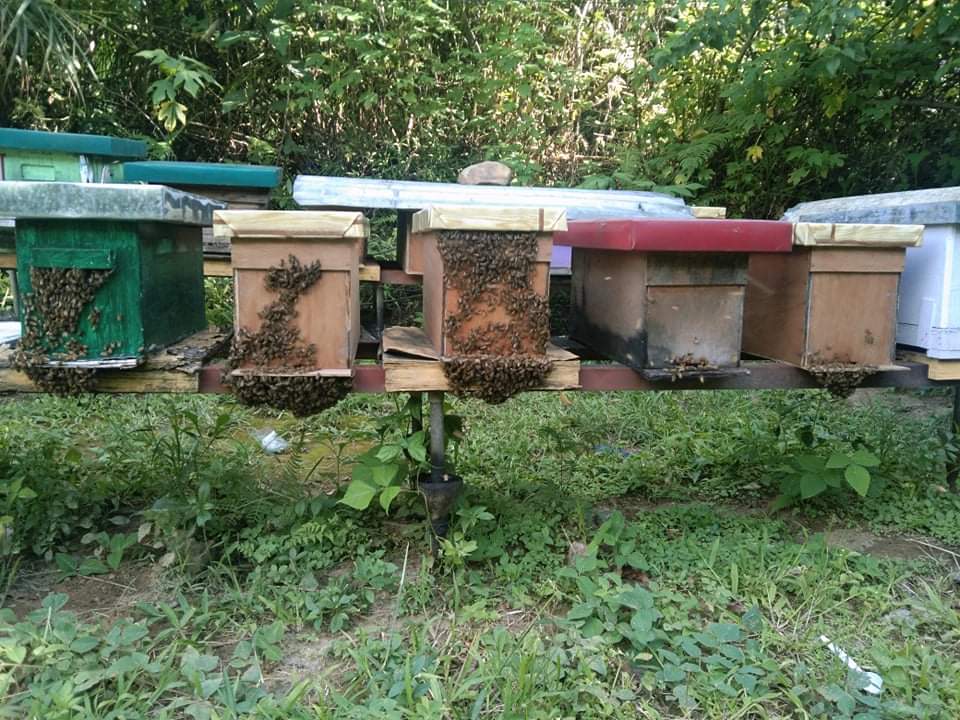
In 2020, as the pandemic swept the country, Guada anticipated more challenges. Surprisingly, her beekeeping efforts turned out to be a source of income during the crisis. While selling honey had previously been a struggle, the pandemic brought a change and customers actively sought out her honey after realizing the value of health.
Guada joined the 2022 Department of Agriculture's Young Farmer’s Challenge, winning on the provincial level. The Young Farmers Challenge is a competitive grant program by the Department of Agriculture that provides financial assistance to young individuals venturing into agricultural enterprises by providing start-up capital.
By 2023, she observed the hardships faced by her neighbors who had lost their jobs within the community. Seeking to assist them, she reached out to the Department of Trade and Industry for skill training in food processing. As a result, her community engaged in the production of processed food items, such as turmeric-lemonade tisane, mushroom alamang, and mushroom chili paste.
Guada took on the role of guiding her community members in managing and marketing their products. With the help of the Department of Agriculture, they managed to showcase their offerings, using raw materials sourced from their own produce. This initiative not only provided livelihood opportunities within the community but also offered a way to generate income.

She also extended a helping hand to individuals aspiring to work in the beekeeping industry in New Zealand through her apiary. They approached her seeking guidance and experience, hoping to gain valuable insights under her supervision.
Recognizing the opportunity for mutual benefit, she agreed to take them under her wing as unpaid workers. In return, she offered assistance with their documentation processes. Over time, she successfully trained four aspiring beekeepers who have since secured employment opportunities abroad.
Bees and environmental concerns
Guada recently faced a devastating incident that led to the loss of several bee colonies. A group of miners were using acids for gold ore extraction near her apiary and the chemical fumes generated by this process reached the bee colonies, resulting in their unfortunate deaths.
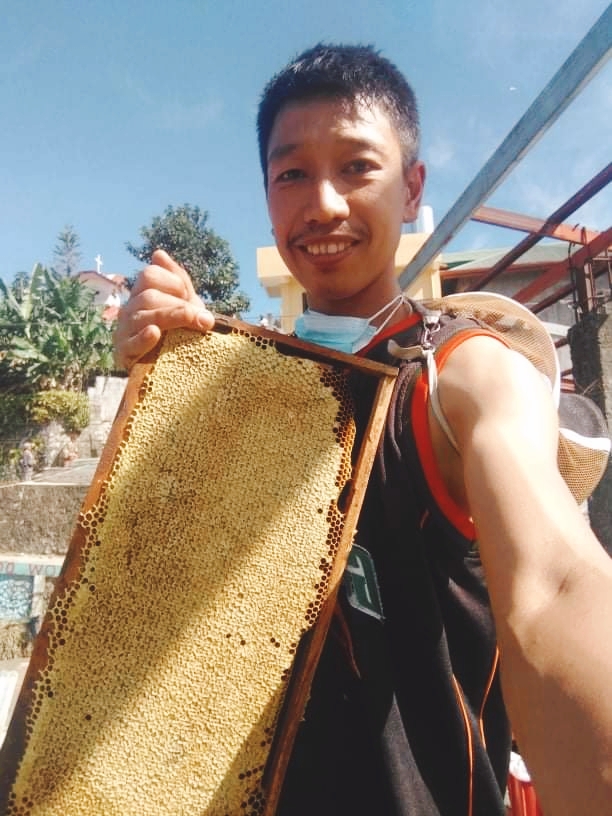
The exposure of bee colonies to chemical poisons presents a grave danger. Bees unintentionally carry these harmful chemicals from treated flowers and bodies of water back to the hive. As bees exchange food and substances within the colony, these chemicals can spread, affecting workers, larvae, and even the queen bee. This poisoning takes a toll on their health and capabilities. The colony's ability to forage, care for the young, and protect the hive weakens over time, eventually leading to a decline and potential collapse of the entire population.
To counteract these risks, Guada actively advises coffee farmers in her vicinity to inform her in advance when they plan to use harmful chemicals on their crops. This advance notice enables her to take necessary precautions to safeguard her bee colonies. Despite her efforts, there have been instances where lack of communication has resulted in the loss of some of their bees.
Confronted by these challenges, Guada found herself compelled to transfer her bee colonies to a different location. However, this transition incurs added expenses and efforts for transportation. Despite being situated in a mining community, they persistently emphasize the detrimental effects of harmful chemicals on the environment. They also passionately advocate for the adoption of organic farming practices among local farmers.

Passion, persistence, and inspiration
“Addressing honey fraud is a significant issue among beekeepers, and we strive to maintain transparency with our customers,” Guada said. “We ensure that all our paperwork and procedures, from production to bottling, are readily available for them to review. We are committed to maintaining purity in our actions.”
Introducing beekeeping to Itogon has been marked by challenges, particularly in the face of traditional honey harvesting methods employed by wild bee hunters. The community is filled with skepticism from those who doubt the authenticity of honey, often suspecting it to be adulterated with sugar.
“To address this, I take the time to discuss the significance of beekeeping with customers,” Guada said. “Our focus isn't solely on selling honey; we also emphasize the industry's benefits, not only for our health but also for the environment. Despite our efforts, critics still remain, but we persevere in advocating for the value of beekeeping.”
Providing complimentary assistance to all her customers is a strategy that greatly influences them to patronize Guada’s services and products. Working hand in hand with the LGU, the Municipal Agriculture Office, and the livelihood center, she organizes and hosts free training sessions. These gatherings have garnered the interest of coffee farmers who are teaming up with the beekeepers to elevate their coffee production by leveraging enhanced pollination techniques through bees.
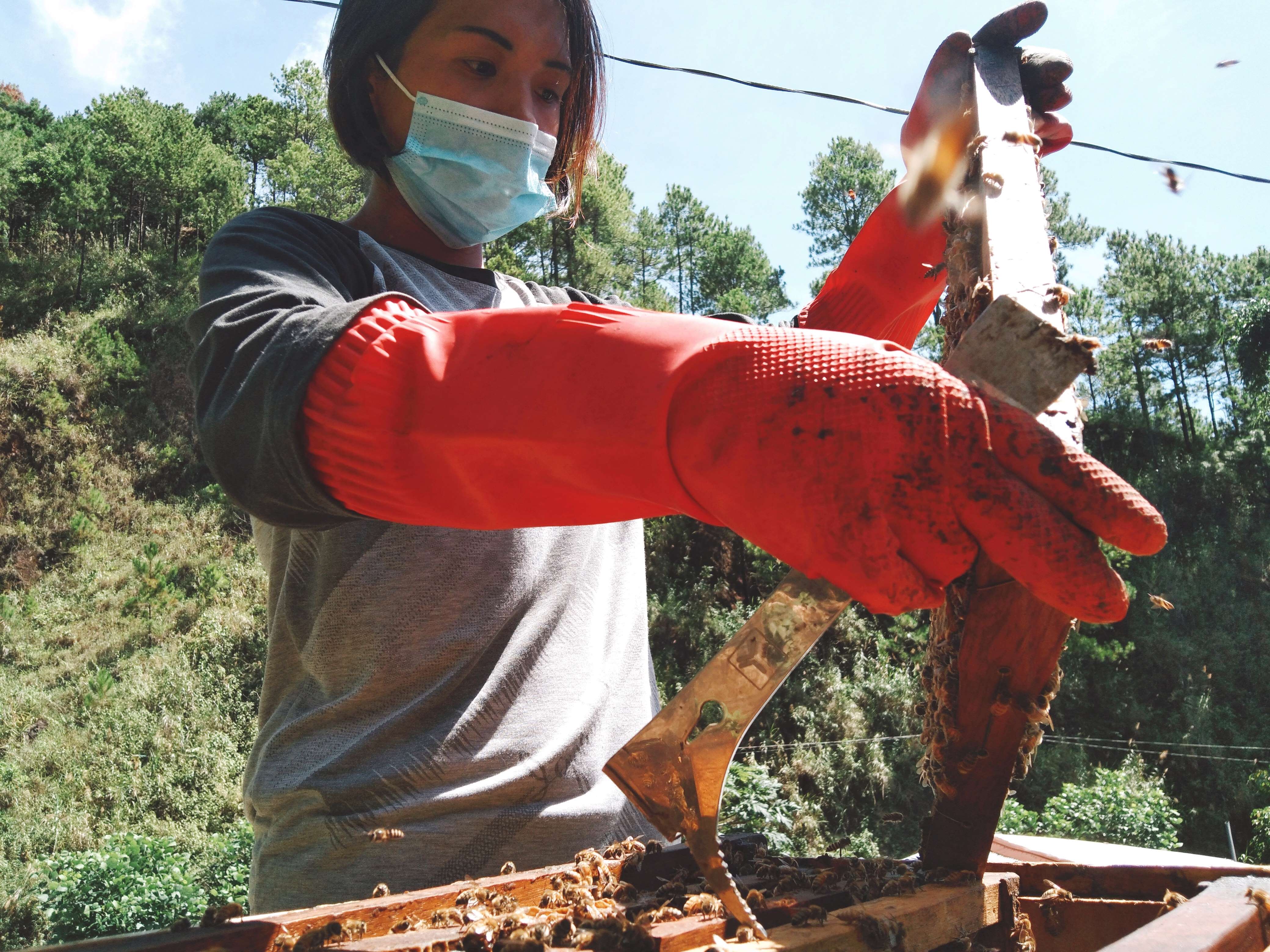
“This approach is rooted in gratitude,” Guada said. “I recognize that without the support of the government, I wouldn't have had the opportunity to acquire the skills I possess.”
Another significant objective of her training endeavors is to ensure the continuity of the local honey supply within the country. “The prevalence of honey fraud stems from an insufficient availability of genuine local honey,” she said.
Guada's vision extends beyond preparing beekeepers solely for overseas employment; she aims to empower them to establish their own bee farms within the country. Her particular focus lies on elderly individuals who possess abundant land resources, a different situation compared to their own scenario of limited land availability. Their nectar source is primarily tied only to the wild sunflower season occurring in December.
Market expansion
Her main honey customers tend to be local community members. Guada has slightly scaled back her honey advertising endeavors due to intermittent difficulties in meeting the demand. To broaden her outreach, she’s established collaborations with distributors in Baguio.
She’s also actively progressing into the online market. She’s completed the necessary paperwork and taken steps to enhance both their products and packaging, all in preparation for this new avenue of sales and promotion.
The apiary provides the opportunity for bulk purchases of its honey, with a rate of P650 per kilogram. For reselling purposes, an 8oz bottle is priced at P250, while the retail price is established at P320 per bottle.

The power of passion
Many people have noticed that Guada's business efforts have a noble character, resembling that of a charitable institution. Even though she leans towards the idea of providing things for free, “what truly drives me is the growing interest people show in the craft we pursue,” she said. “We consistently share our skills to ensure sustainability within our community.”
“On my journey in this venture has been marked by moments of difficulty, stress, and fatigue,” Guada said. “Yet, these challenges serve as sources of inspiration to bounce back.” What comforts her is knowing that her work has a positive impact on her community and the environment.
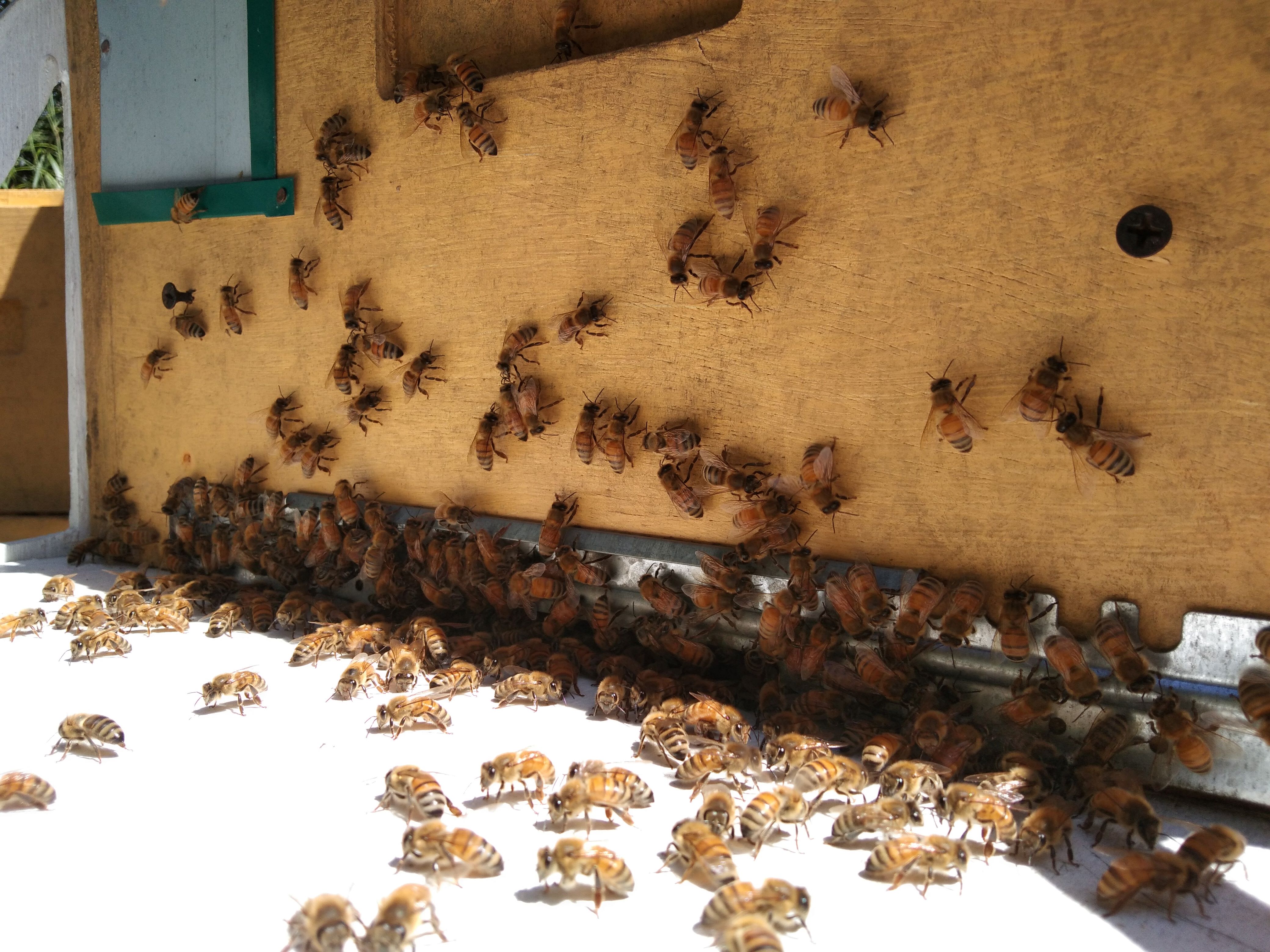
At the core of her efforts is the aim to support sustainable farming through beekeeping. Through Purest Heart Apiary, Guada helps farmers diversify their income. Many farmers struggle with the changing prices of crops. By introducing beekeeping as another way to earn, she wants to help them deal with these uncertainties. Instead of using harmful chemicals, she believes in using bees' natural abilities to help crops grow. Globally, about 75% of crops depend on bees for pollination. She's also deeply committed to protecting the environment.
The next article will discuss the benefits of developing the bee industry in the Philippines, shedding light on the positive outcomes and growth opportunities it can offer for the country.
READ: Five benefits of developing the bee industry in the Philippines
Photo courtesy of Purest Heart Apiary